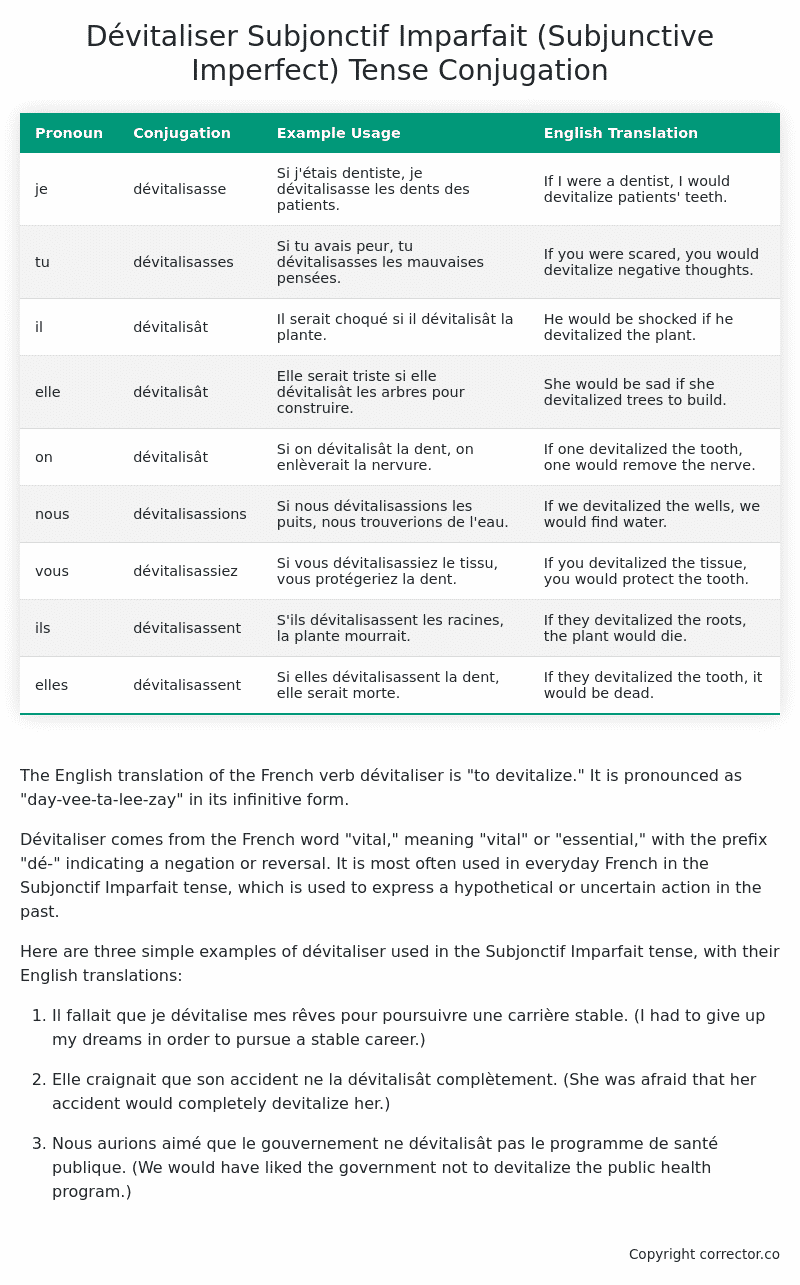Subjonctif Imparfait (Subjunctive Imperfect) Tense Conjugation of the French Verb dévitaliser
Introduction to the verb dévitaliser
The English translation of the French verb dévitaliser is “to devitalize.” It is pronounced as “day-vee-ta-lee-zay” in its infinitive form.
Dévitaliser comes from the French word “vital,” meaning “vital” or “essential,” with the prefix “dé-” indicating a negation or reversal. It is most often used in everyday French in the Subjonctif Imparfait tense, which is used to express a hypothetical or uncertain action in the past.
Here are three simple examples of dévitaliser used in the Subjonctif Imparfait tense, with their English translations:
-
Il fallait que je dévitalise mes rêves pour poursuivre une carrière stable. (I had to give up my dreams in order to pursue a stable career.)
-
Elle craignait que son accident ne la dévitalisât complètement. (She was afraid that her accident would completely devitalize her.)
-
Nous aurions aimé que le gouvernement ne dévitalisât pas le programme de santé publique. (We would have liked the government not to devitalize the public health program.)
Table of the Subjonctif Imparfait (Subjunctive Imperfect) Tense Conjugation of dévitaliser
| Pronoun | Conjugation | Example Usage | English Translation |
|---|---|---|---|
| je | dévitalisasse | Si j’étais dentiste, je dévitalisasse les dents des patients. | If I were a dentist, I would devitalize patients’ teeth. |
| tu | dévitalisasses | Si tu avais peur, tu dévitalisasses les mauvaises pensées. | If you were scared, you would devitalize negative thoughts. |
| il | dévitalisât | Il serait choqué si il dévitalisât la plante. | He would be shocked if he devitalized the plant. |
| elle | dévitalisât | Elle serait triste si elle dévitalisât les arbres pour construire. | She would be sad if she devitalized trees to build. |
| on | dévitalisât | Si on dévitalisât la dent, on enlèverait la nervure. | If one devitalized the tooth, one would remove the nerve. |
| nous | dévitalisassions | Si nous dévitalisassions les puits, nous trouverions de l’eau. | If we devitalized the wells, we would find water. |
| vous | dévitalisassiez | Si vous dévitalisassiez le tissu, vous protégeriez la dent. | If you devitalized the tissue, you would protect the tooth. |
| ils | dévitalisassent | S’ils dévitalisassent les racines, la plante mourrait. | If they devitalized the roots, the plant would die. |
| elles | dévitalisassent | Si elles dévitalisassent la dent, elle serait morte. | If they devitalized the tooth, it would be dead. |
Other Conjugations for Dévitaliser.
Le Present (Present Tense) Conjugation of the French Verb dévitaliser
Imparfait (Imperfect) Tense Conjugation of the French Verb dévitaliser
Passé Simple (Simple Past) Tense Conjugation of the French Verb dévitaliser
Passé Composé (Present Perfect) Tense Conjugation of the French Verb dévitaliser
Futur Simple (Simple Future) Tense Conjugation of the French Verb dévitaliser
Futur Proche (Near Future) Tense Conjugation of the French Verb dévitaliser
Plus-que-parfait (Pluperfect) Tense Conjugation of the French Verb dévitaliser
Passé Antérieur (Past Anterior) Tense Conjugation of the French Verb dévitaliser
Futur Antérieur (Future Anterior) Tense Conjugation of the French Verb dévitaliser
Subjonctif Présent (Subjunctive Present) Tense Conjugation of the French Verb dévitaliser
Subjonctif Passé (Subjunctive Past) Tense Conjugation of the French Verb dévitaliser
Subjonctif Imparfait (Subjunctive Imperfect) Tense Conjugation of the French Verb dévitaliser (this article)
Conditionnel Présent (Conditional Present) Tense Conjugation of the French Verb dévitaliser
Conditionnel Passé (Conditional Past) Tense Conjugation of the French Verb dévitaliser
L’impératif Présent (Imperative Present) Tense Conjugation of the French Verb dévitaliser
L’infinitif Présent (Infinitive Present) Tense Conjugation of the French Verb dévitaliser
Struggling with French verbs or the language in general? Why not use our free French Grammar Checker – no registration required!
Get a FREE Download Study Sheet of this Conjugation 🔥
Simply right click the image below, click “save image” and get your free reference for the dévitaliser Subjonctif Imparfait tense conjugation!

Dévitaliser – About the French Subjonctif Imparfait (Subjunctive Imperfect) Tense
Formation
Common Everyday Usage Patterns
Interactions with Other Tenses
Subjonctif Présent
Indicatif Passé Composé
Conditional
Conditional Perfect
Summary
I hope you enjoyed this article on the verb dévitaliser. Still in a learning mood? Check out another TOTALLY random French verb conjugation!


